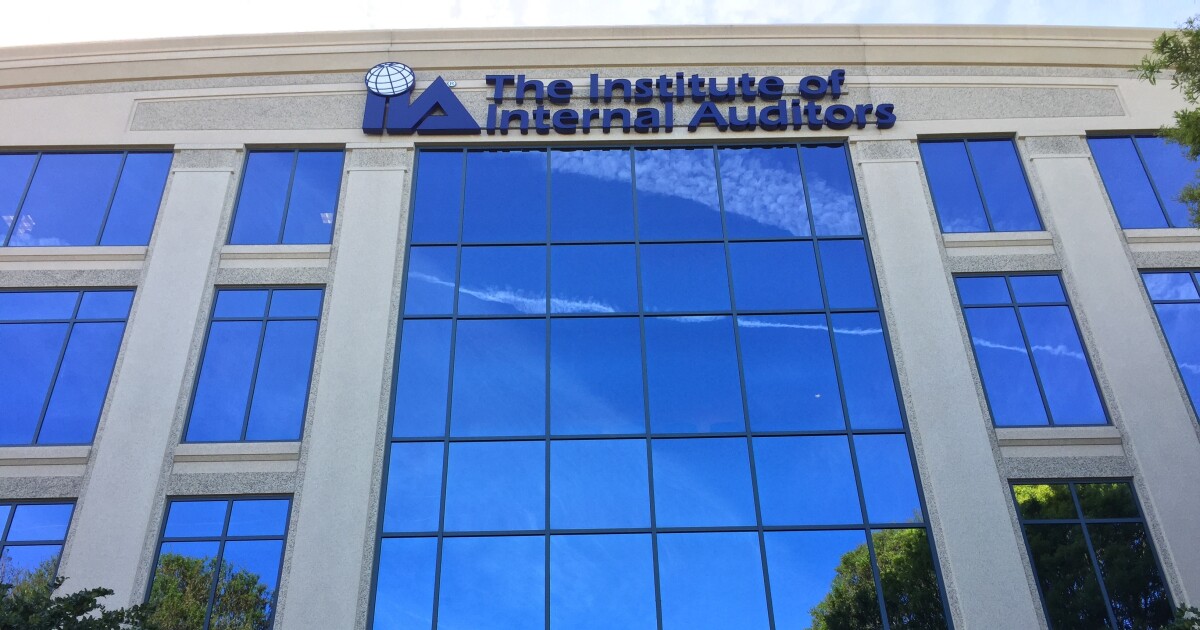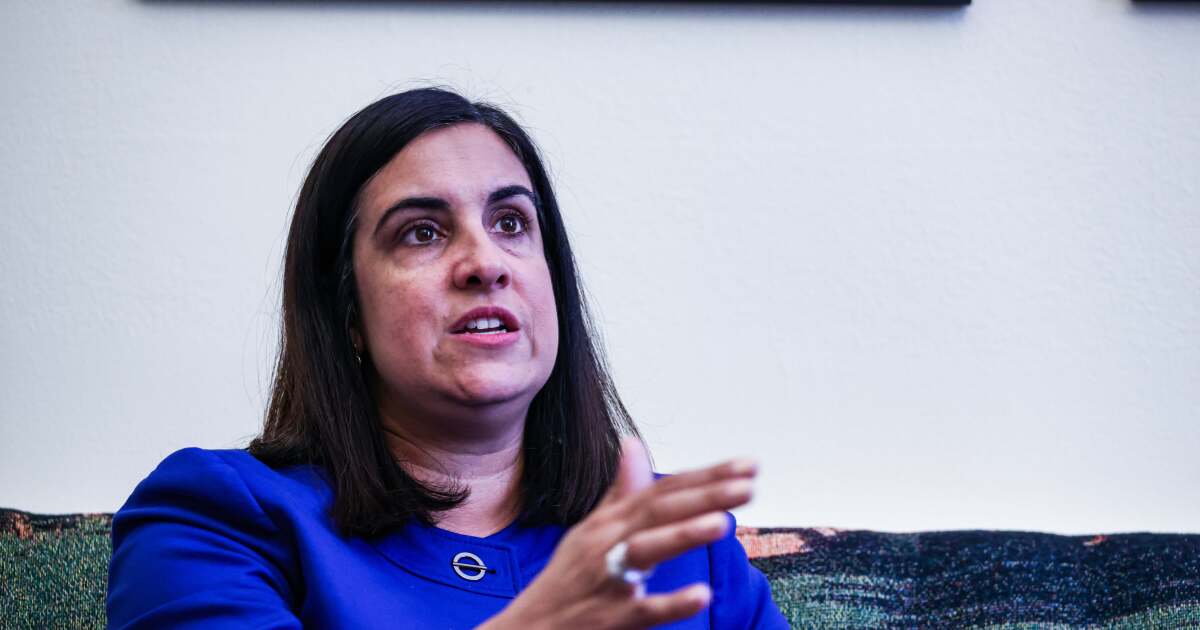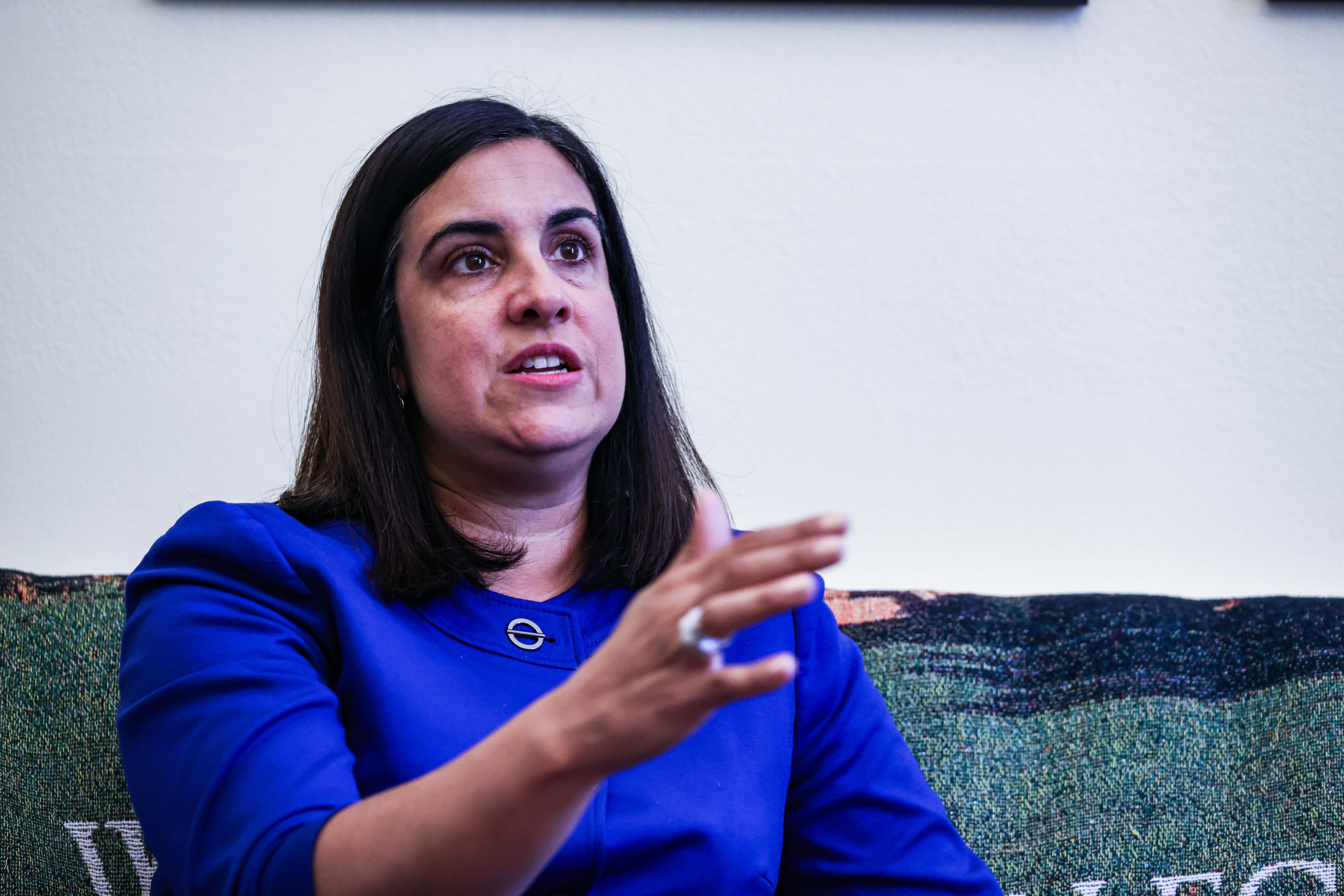Accounting
Internal audit faces a critical decade ahead
Published
9 months agoon


Earlier this summer I had the pleasure of presenting The IIA Internal Audit Foundation’s newly released
However, I also want to be clear that if we remain complacent — if we believe that business as usual is good enough — there is a very clear risk that the profession will be rendered irrelevant by 2035. I don’t believe that is a likely outcome, but it is well within the range of possibility. The good news is that our future is firmly in our own, steady hands.
Picking up the pace on technology adoption
Many of the discussions I’ve had over the past month center around technology. Our members have heard us explaining how critical emerging technologies will be to our future — a fact that is underscored in the Vision research. However, we are not doing enough collectively to spur rapid adoption. We must refocus our efforts from the “why”‘ to the “how.”
The Vision findings uncover the extent to which internal audit functions are lagging in their embrace of new technology. While 97% of respondents believe technology will enhance the complexity and volume of data they can analyze, a much smaller portion of practitioners are actively implementing new technology in their audit functions. For example, only 7% are implementing AI at an advanced level in their audit activities, even though 74% of respondents believe AI is the most important technology for the future of the profession.
We as a profession have the responsibility to encourage greater adoption and successful implementation of AI and emerging technologies. The IIA has launched several online resources, including an AI Knowledge Center, to help practitioners successfully use AI tools within their audit functions. We are dedicated to continuing to support audit practitioners as they adapt and evolve to technological change.
Shifting from assurance to advisory
Leveraging new technologies to enhance analytics and increase efficiency is a critical step toward developing more actionable insights for organizations and their stakeholders. The ability to transform insights into proactive recommendations and strategy is crucial to the future of the profession and an important shift that was underscored by the Vision findings.
Overwhelmingly, Vision respondents expect that advisory work will become more essential in the near-term and will play a much bigger role in their annual plans. As the profession evolves, organizations and stakeholders have come to expect more from internal audit, and the shift from providing assurance and compliance services to becoming a proactive, strategic advisor is essential. As such, practitioners must shift their focus to identifying what organizations can and should do to stay ahead of potential risks and set themselves up for growth and success down the line. I believe Vision 2035 can serve as a roadmap, steering us toward a future where internal auditors are no longer merely the “compliance police,” but instead are seen as indispensable strategic advisors.
Lifting as we climb
The overwhelming participation and global support for Vision 2035 has demonstrated a clear dedication and passion for the profession. Internal auditors gain a great deal of satisfaction from the contributions they make on the job. More than 75% of practitioners surveyed said that being able to add value to their organization is the most exciting part of the job, and many also cherish the chance to problem solve and be a trusted advisor to stakeholders.
As we continue to advance internal audit over the next decade, we must channel this enthusiasm into improving external perceptions of the profession. Nearly half of the practitioners surveyed for Vision reported that being misunderstood or undervalued is the greatest challenge to the profession. However, I believe we can flip this if we prioritize stronger communication from important advocates and ambassadors for the profession – including internal audit function leaders, hiring managers and educators — about the value that internal audit provides and the key aspects of the profession that inspires the most excitement.
Harnessing this enthusiasm to showcase the profession’s importance is essential to attracting promising new talent for the next generation of practitioners and fostering a motivated internal audit community.
The road to 2035
As we look toward 2035, we must transform the current perceptions of internal audit by embracing technology, broadening our scope, integrating internal audit with strategy, and enhancing our talent pipeline. Internal auditors, regardless of their level, industry or geography, must possess the skills to address emerging risks while inspiring confidence in stakeholders that we can effectively tackle any challenges in our way.
The Internal Audit Foundation initiated the Vision project because we understand the critical role The IIA’s dynamic leadership must play if the profession is to realize this envisioned future. The title of the report, “Creating Our Future Together” underscores the global effort of drawing insights and input from a community of internal audit practitioners worldwide, so too must be our efforts to continue the groundswell of momentum we have built.
We’ve created an
The IIA will lead the way to achieve Vision 2035. Central to our organizational strategy is a commitment to Advocate, Elevate, Educate and Collaborate to grow the profession and its influence. Our profession has a storied history of resilience and adaptability in the pursuit of excellence. Let us act collaboratively to build support from external stakeholders through close coordination as we chart a path forward that is founded on trust, anchored by integrity, and relentless in the quest for progress.
You may like
Accounting
Essential Strategies for Maintaining Data Security in Modern Bookkeeping
Published
1 day agoon
May 10, 2025
In the modern world of digital finance, securing bookkeeping data is not just a good business habit—it’s absolutely essential. Bookkeepers work with confidential financial records, including income reports, payroll details, tax filings, and banking information. As cyber threats continue to evolve, protecting this data is a critical step in maintaining trust, ensuring compliance, and supporting business continuity. Let’s explore effective, easy-to-understand strategies that bookkeepers and businesses can use to strengthen their data security and avoid unnecessary financial risks.
Control Who Has Access to Financial Data
One of the first steps in keeping bookkeeping data secure is managing access control. Not every employee in a company needs access to financial information. Set permissions so that only those who absolutely need access—like bookkeepers, accountants, or certain managers—can see or edit sensitive records. This limits the chances of internal data leaks or accidental changes.
Use multi-factor authentication (MFA) for all financial software platforms. This adds an extra layer of protection beyond just a password. Even if a hacker steals someone’s login details, they can’t access the system without the second form of verification. Regularly conduct access reviews and audits to make sure permissions are current and appropriate.
Encrypt Data at All Times
Think of data encryption as the protective armor surrounding your financial files. Encryption converts information into unreadable code that can only be unlocked with a special key. Whether you’re storing records in the cloud, on a local device, or sending financial statements to clients, encryption ensures your data stays protected from cybercriminals.
For cloud-based accounting systems, make sure the provider offers end-to-end encryption and follows industry security standards. Also, be sure any email or messaging platform used to transmit bookkeeping data uses secure, encrypted connections.
Create a Reliable Backup Plan
Backing up bookkeeping data is a huge part of data security. A good rule to follow is the 3-2-1 backup strategy:
- Keep 3 copies of your data.
- Store them on 2 different media types (like a computer and an external hard drive).
- Keep 1 copy off-site, either physically or in the cloud.
This ensures that if your local systems are ever hacked, damaged, or lost due to hardware failure, your financial data is still safe and recoverable. Set up automated backup schedules to keep your backups current, and test the restoration process regularly to ensure you can access the data when needed.
Keep Accounting Software Up to Date
Outdated accounting software can become an open door for cybercriminals. Software providers release security updates and patches to fix bugs and defend against new threats. If you’re using software like QuickBooks, Xero, or Wave, enable automatic updates whenever possible. Check for updates weekly if you’re managing the process manually.
Always keep any antivirus and firewall systems active and updated. These tools act as your first line of defense against malware, ransomware, and other digital threats that could compromise your financial data.
Train Your Team on Data Security Best Practices
Technology alone can’t prevent security breaches. Human error is still the leading cause of many data security incidents. That’s why it’s important to train everyone involved in bookkeeping—even if it’s just a few team members—on cybersecurity basics.
Training should cover how to spot phishing emails, create strong and unique passwords, handle data responsibly, and respond to suspicious activity. Even quick, regular refresher sessions can greatly reduce your risk.
Keep a Clear Audit Trail
Document everything related to financial activity and data access. This includes who logs into your accounting systems, what changes they make, and when. Keeping an accurate audit trail helps you identify the source of any errors or breaches quickly. It’s also vital for regulatory compliance, especially if you undergo an audit by the IRS or other financial authority.
Choose bookkeeping software that includes activity logs and make sure they’re enabled. These logs can help you track down security problems before they get worse and provide evidence if something ever goes wrong.
Make Security an Ongoing Priority
Cybersecurity is not a one-time project. It’s a regular part of doing business in the digital age. As your business grows and technology changes, your approach to bookkeeping data security must evolve too. Review your data protection strategies quarterly, and update them to keep up with new threats and industry trends.
It’s also wise to stay informed about bookkeeping regulations, data privacy laws like GDPR or CCPA, and compliance requirements that apply to your business. The more proactive you are, the safer your financial records will be.
Data Security is the Foundation of Trust
Maintaining data security in bookkeeping is about more than just protecting your business—it’s about preserving your clients’ trust and your company’s reputation. From managing access controls and using encryption to updating software and training staff, each small step adds up to a stronger defense against potential threats.
When you make data protection a core part of your bookkeeping process, you reduce risks, improve accuracy, and ensure your business is always ready to face challenges. Remember, a secure bookkeeping system is the foundation of a successful, trustworthy, and future-ready business.
Accounting
AI great at simple tasks but struggles with complexity
Published
2 days agoon
May 9, 2025
Artificial intelligence has indeed led tech-forward firms (including those in this year’s
On the positive end, firms such as the Texas-based Franklin Alliance reported that adopting AI technology has dramatically increased their capacities as bots take on repetitive manual tasks with an ease and a speed far past more conventional automation setups, allowing accountants to focus more on higher value tasks.
“What’s been most impressive about the AI tools we’ve explored is their ability to dramatically reduce the time spent on repetitive, manual tasks—things like document summarization, data extraction, and even early-stage tax prep. In the right context, these tools create real efficiency gains and allow our team to shift focus to higher-value advisory work,” said Benjamin Holloway, co-founder of Texas-based Franklin Alliance.

madedee – stock.adobe.com
For some, like Illinois-based Mowery & Schoenfeld, these efficiencies have been most impressive on the internal administration side, with AI effectively taking care of the non-accounting work that nonetheless keeps many firms afloat, especially where it concerns meetings.
“Truly most impressive and a huge time savings for us has been AI’s ability to record and summarize Team meetings. Circulating notes and reducing administrative burden on such activities has freed up much capacity, both for our admin side and for partners or management who are not able to be at every meeting,” said Chris Madden, director of information technology.
Others, like top 10 firm Grant Thornton, emphasized AI’s benefits in client-facing activities and noted that it has been especially meaningful in its risk advisory services at least partially due to the firm’s recently-launched CompliAI tool, designed specifically for this area.
“The tool uses generative artificial intelligence and was developed using Microsoft technology, including Microsoft Azure OpenAI Service. CompliAI’s ability to quickly analyze vast datasets and identify potential risks has proven invaluable in combining Grant Thornton’s extensive global controls library with generative AI models and features, including AI analysis, ranking and natural language processing capabilities. As a result, our employees can run control design and assessment tasks in minutes, versus days or weeks. This means clients enjoy faster operational insights, which could amount to a new level of efficiency and a path toward transformative growth,” said Mike Kempke, GT’s chief information officer.
Another positive frequently mentioned, such as by top 25 firm Cherry Bekaert, has been the accessibility and ease of use for many AI solutions even for those without strong technical capacities. Assurance partner Jonathan Kraftchick said this means they did not need to wait long before they began seeing results.
“The most impressive aspect of AI has been its ability to add value with minimal ramp-up time. Many of the tools we’ve implemented have a low barrier to entry, allowing users to start experimenting and seeing results almost immediately. Whether it’s drafting content, conducting accounting research, summarizing meetings, normalizing data, or detecting anomalies, AI has consistently helped accelerate tasks and enable our teams to focus on higher-risk or higher-value areas,” he said.
Several firms, such as California-based Navolio & Tallman, also mentioned improvements to broad strategy and ideation, saying it’s been good for enhancing creativity and accelerating the early stages of their work.
“We’ve still seen value in AI as a jumping off point for ideas and strategy. It’s been helpful for brainstorming, drafting early versions of client communications, and supporting high-level planning conversations,” said IT partner Stephanie Ringrose.
Inconsistencies, inaccuracies, insufficiency, and insecurity
At the same time, firms over and over again said that while the strength of AI comes in handling simple jobs, it often lacks the precision and consistent accuracy needed for higher value accounting work. While it can certainly generate outputs at an industrial scale, trusting that those outputs are correct is another story for firms like Community CPA and Associates.
“AI is incredibly useful for certain types of tasks, such as summarization, data extraction, answering simple questions, drafting communications or documentation, brainstorming ideas, or serving as a sounding board. However, we have observed that most AI tools we’ve tried have difficulty with complex tasks that require lots of context, precision, or domain-specific knowledge. Oftentimes in these cases, AI tools will generate responses that are overly confident or wrong and are missing key information due to not being integrated with other systems or software we have,” said CEO Ying Sa.
Some, like top 25 firm Armanino, noted that these challenges mean that humans need to devote considerable time to ensuring the quality of AI outputs and intervening when the programs go off track.
“The primary disappointment stems from the occasional inaccuracies or biases inherent in AI-generated outputs, commonly referred to as ‘hallucinations,’ necessitating continuous human oversight to ensure reliability. Addressing these inconsistencies remains an ongoing challenge,” said Jim Nagata, senior director of cybersecurity and IT operations.
Top 25 firm Eisner Amper’s chief technology officer Sanjay Desai noted that these issues with accuracy and consistency can be found across AI solutions, though noted that the technology is still quite new and so many things are still in the process of being refined.
“The lows come from the gap between what’s possible and what works reliably in practice. We still need strong guardrails to define valid inputs and outputs, especially in sensitive use cases. Technologies like retrieval augmented generation (RAG) haven’t yet delivered the accuracy or consistency we need when working with proprietary or domain-specific data. Even in mature areas like audio-to-text transcription, we see issues—particularly with accurately identifying speakers in multi-person meetings, which affects the quality of recaps and follow-up actions. In short, while LLMs have come a long way, making them enterprise-ready still requires ongoing human oversight, thoughtful implementation, and continuous refinement,” said Desai.
Another issue reported by several firms was what firms like Navolio & Tallman saw as ongoing security risks from AI solutions that limits their ability to apply the technology to more sensitive use cases.
“The overall attention to security and privacy is still more limited than our industry requires, vendors have not yet aligned their pricing models with the impact their tools make to the business, and vendors still oversell their AI capabilities,” she said.
Top 25 firm Citrin Cooperman also noted–among other things–that the security of these solutions could stand to improve.
“The overall attention to security and privacy is still more limited than our industry requires, vendors have not yet aligned their pricing models with the impact their tools make to the business, and vendors still oversell their AI capabilities,” said chief information officer Kimberly Paul.
Another issue with AI that firms have reported is that solutions today don’t seem to integrate especially well with other programs, which limits the ability of these solutions to work across multiple systems in a single coherent workflow–under such conditions, AI solutions can wind up being siloed from the very areas it is needed the most.
“We believe one of the biggest gaps in current AI solutions is the inability to integrate into other AI solutions to work collectively across one process or workflow. There are many cases where one AI solution is very good at a specific task, while another is very good at another process or task, but the gap is the ability to integrate those solutions together to solve for an entirety of a process or a workflow,” said Brent McDaniel, chief digital officer for top 25 firm Aprio.
There is also the matter of data integration, which is needed for AI systems to gain a more holistic understanding of a firm’s needs. Without such integrations, AI becomes more limited in its ability to develop insights and provide actionable guidance, according to Tom Hasard, IT shareholder for New Jersey-based Wilken Gutenplan.
“We wish AI tools could fully synthesize all of our internal data and unique expertise—beyond the scope of general internet search—and provide detailed, context-specific answers for our team. In the near term, we envision an internal system that taps into our accumulated knowledge to assist staff in resolving complex client problems more quickly. Over time, this capability could be extended to give clients direct, on-demand access to our specialized insights, effectively scaling our expertise and delivering value in a more immediate and personalized way,” he said.
Beyond just data, lack of integration also limits the ability for AI to address complex problems due to lack of cross-disciplinary expertise, according to Kempke from Grant Thornton.
“Current AI solutions lack the deep cross-disciplinary expertise to be able to solve complex issues. AI today is optimized for specific fields and tasks but when it comes to solving problems that span multiple disciplines such as Tax, Legal and Finance, the current solutions are not yet capable of providing meaningful advice and guidance. Grant Thornton is already working with various AI partners on this issue and targets to be a very early adopter of the next iteration of AI that addresses this,” he said.
The AI wishlist
Many firms hoped that the next generation of AI solutions would address these sorts of problems in a way that will allow them to become true assistants capable of taking on complex tasks that require extensive judgment.
“We have found that AI currently lacks in the ability to replicate human creativity and complex decision-making. While AI excels at data analysis and task automation, it struggles with tasks requiring creativity and nuanced judgment. If AI could offer more sophisticated support in areas such as accounting and audit services, its value and impact in our daily lives would be significantly enhanced,” said Jim Meade, CEO of top 50 firm LBMC.
Desai, from Eisner Amper, also pointed out that AI isn’t very good at handling bad data, which is a problem considering that AIs run on data. This means that using AI effectively today still requires a great deal of data processing and sanitation to make information useful. If humans did not need to do so much manual cleanup to get data AI-ready, it would help make the technology even more efficient.
“One of the biggest gaps in AI today is its limited ability to handle bad data. Since data is the foundation of any AI strategy, it’s a challenge that most organizations still face— dealing with messy, inconsistent, or unstructured data. We wish AI could do more to identify, fix, and improve data quality automatically, instead of relying so much on manual cleanup,” said Desai.
Finally, Avani Desai, CEO of top 50 firm Schellman, said that AI needs to not only be safer, it needs to be visibly so, as trust and confidence in the technology is often key to adoption.
“I wish that AI could de-risk itself so that clients would be more open to using it and build client trust. If AI could more clearly demonstrate safety and responsible use, adoption would be much easier. Once people understand it’s here to help—and learn to use it responsibly—the fear will fade,” she said.


Representative Nicole Malliotakis said increasing the state and local tax deduction cap to $30,000 from $10,000 would reduce the tax burden of the vast majority of people in her district, indicating support for a proposal that is dividing Republicans.
“Every member needs to advocate for the particular needs of their district. Tripling the deduction to $30,000 will provide much-needed relief for the middle-class and cover 98% of the families in my district,” Malliotakis, a Republican representing Staten Island, New York and a member of the House tax committee, said in a statement to Bloomberg News on Friday.
Malliotakis’ nod of approval for a $30,000 SALT deduction cap comes as Republicans are fighting among themselves about how high to increase a tax break that has the potential to scuttle President Donald Trump’s entire tax package.
House Speaker Mike Johnson on Thursday said the $30,000 write-off limit is one of several options being discussed. That figure was rejected by several other New York Republicans, including Elise Stefanik, Nick LaLota, Mike Lawler and Andrew Garbarino. California’s Young Kim also rebuffed the idea.
Malliotakis’ district has less expensive property values and lower incomes than some of the other lawmakers pushing for a SALT expansion, making it politically viable for her to accept a lower cap than some of her colleagues.
White House Press Secretary Karoline Leavitt suggested on Friday that Trump would not weigh in on an appropriate level for a SALT cap, leaving it to lawmakers to resolve.
“There’s a lot of disagreement on Capitol Hill right now about the SALT tax proposal, and we will let them work it out,” she told reporters.
House Republicans’ narrow majority means that Johnson needs to win the support of nearly all his members to pass Trump’s tax-and-spending package.
Several of the SALT advocates have said that they are willing to block the bill unless there is a sufficient increase to the deduction. However, most members have not publicly stated how high the deduction must be to win their support.
The debate over SALT has proved to be a particularly thorny fight because it is a political priority for a small but vocal group of Republicans representing swing districts critical to the party maintaining a majority in the 2026 midterm elections.
Expanding the write-off is an expensive proposition, and Republicans have little fiscal wiggle room as they are sparring over ways — including cuts to Medicaid and levy hikes on millionaires — to offset the cost of the tax-cut package.
The House Ways and Means Committee is slated to consider the tax portion of the bill on Tuesday, including SALT changes.

Social Security changes to monitor under new agency leadership

Essential Strategies for Maintaining Data Security in Modern Bookkeeping

Investor Ric Edelman reacts to crypto ETF boom

New 2023 K-1 instructions stir the CAMT pot for partnerships and corporations

The Essential Practice of Bank and Credit Card Statement Reconciliation

Are American progressives making themselves sad?
Trending
-

 Finance1 week ago
Finance1 week agoWarren Buffett to ask board to make Greg Abel CEO of Berkshire Hathaway at year-end
-

 Finance1 week ago
Finance1 week agoBerkshire meeting ‘bazaar’ features Buffett Squishmallows, 60th anniversary book and giant claw machine
-

 Accounting1 week ago
Accounting1 week agoThe Importance of Backing Up Bookkeeping Data
-

 Economics1 week ago
Economics1 week agoJobs report April 2025:
-

 Economics1 week ago
Economics1 week agoEuro zone inflation, April 2025
-

 Economics7 days ago
Economics7 days agoChina risks deeper deflation by diverting exports to domestic market
-

 Personal Finance4 days ago
Personal Finance4 days agoI bonds investments and Trump’s tariff policy: What to know
-

 Economics1 week ago
Economics1 week agoThe judge losing his patience with the Trump administration
